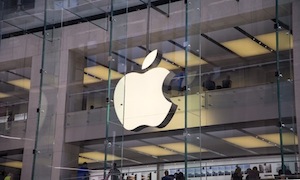Sign up for our free daily newsletter
YOUR PRIVACY - PLEASE READ CAREFULLY DATA PROTECTION STATEMENT
Below we explain how we will communicate with you. We set out how we use your data in our Privacy Policy.
Global City Media, and its associated brands will use the lawful basis of legitimate interests to use
the
contact details you have supplied to contact you regarding our publications, events, training,
reader
research, and other relevant information. We will always give you the option to opt out of our
marketing.
By clicking submit, you confirm that you understand and accept the Terms & Conditions and Privacy Policy
Willkie Farr & Gallagher is advising UK-based consumer group Which? on a £3bn class action against Apple over alleged competition law breaches.
The claim, filed at the Competition Appeal Tribunal (CAT), argues Apple has breached competition law, effectively locking millions of consumers into its iCloud service.
Willkie partners Boris Bronfentrinker and Elaine Whiteford are leading the Apple claim. They are best known for their work in the ongoing Mastercard litigation, with further hearings expected next year.
Leading competition law barristers Philip Woolfe KC and Jack Williams at Monckton Chambers have also been instructed alongside experts from Keystone, AlixPartners and Harvard University. The action is being funded by Litigation Capital Management (LCM) on unspecified terms.
Around 40 million Apple customers in the UK who have obtained iCloud services over the last nine years could receive compensation if the claim is successful.
Which? believes Apple has used its market dominance to engage in anti-competitive practices that reduce choice and increase consumer prices.
The action claims Apple breached UK competition law by giving its iCloud storage service preferential treatment, “trapping” customers with Apple devices into using iCloud.
iCloud is Apple’s cloud storage service that securely stores photos, files and other data online, ensuring they are backed up and accessible. Users get 5GB of free storage, with additional monthly plans from £0.99 to £54.99.
The claim argues that Apple encourages users to sign up for iCloud to store photos and data, making it difficult for them to use other providers. Since Apple doesn’t allow the backing up of all phone data with third-party services, iOS users must pay for iCloud once they exceed the free 5GB limit.
Given Apple’s iOS dominates its devices, Which? said the company must not leverage this power to gain unfair advantages in related markets, like cloud storage, which they say has happened and led to users being overcharged for these subscriptions.
The consumer group argues that customers are “locked in” to a service, affecting price, quality and choice. Apple’s market dominance also creates barriers for new cloud providers and stifles healthy competition, the group says.
Which? claims consumers have been overcharged yearly, increasing to £13.36 this year through their monthly iCloud subscription fees. Apple raised the price of iCloud for UK consumers by between 20% and 29% across its storage tiers in 2023.
Which? is seeking damages for affected Apple customers using iCloud services since 1 October 2015, estimating an average of £70 is owed to individual consumers based on their subscription duration.
The consumer group said Apple could settle the claim if it gave consumers their money back and allowed users a natural choice for cloud services by liberalising its iOS, failing which it would resort to an opt-out collective action brought under the Consumer Rights Act 2015.
Data from the CMS European Class Action report confirms the explosive growth of these proceedings, with claims encompassing more than 540 million class members being filed by the end of last year.
Anabel Hoult, Which? chief executive said: “We believe Apple customers are owed nearly £3bn due to the tech giant forcing its iCloud services on customers and cutting off competition from rival services.
“By bringing this claim, Which? shows big corporations like Apple cannot rip off UK consumers without repercussions. Taking this legal action means we can help consumers get the redress they are owed, deter similar behaviour in the future and create a better, more competitive market.”
One partner at a leading London law firm commented: “This further substantial class action demonstrates that the growth in these claims shows no sign of slowing down,” adding that ‘big tech’ corporations were the funders’ favourite targets, although other industries were also being hit.
Apple denied liability, saying: “Our users are not required to use iCloud, and many rely on a wide range of third-party alternatives for data storage.”
It added: “We work hard to make data transfer as easy as possible – whether to iCloud or another service. We reject any suggestion that our iCloud practices are anti-competitive and will vigorously defend against any legal claim otherwise.”
The claim is one of the latest filed against big tech companies. The CAT has approved a claim by Dr Rachel Kent, supported by Hausfeld, alleging that Apple’s UK App Store had overcharged its customers for App Store purchases. The CAT will hear the claim in 2025.
Email your news and story ideas to: [email protected]









